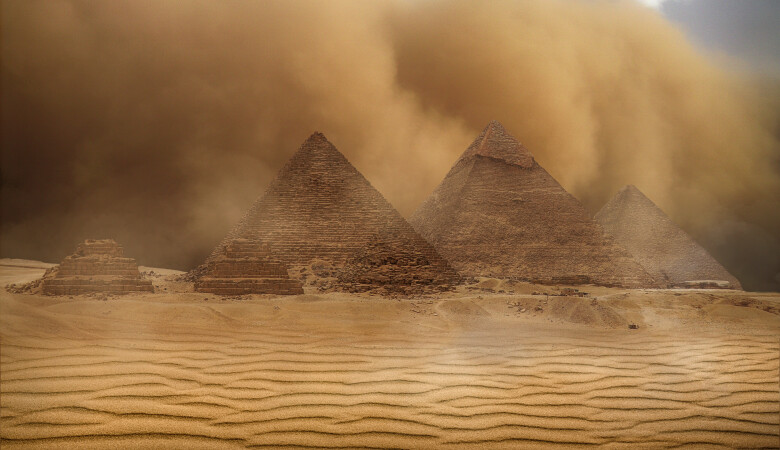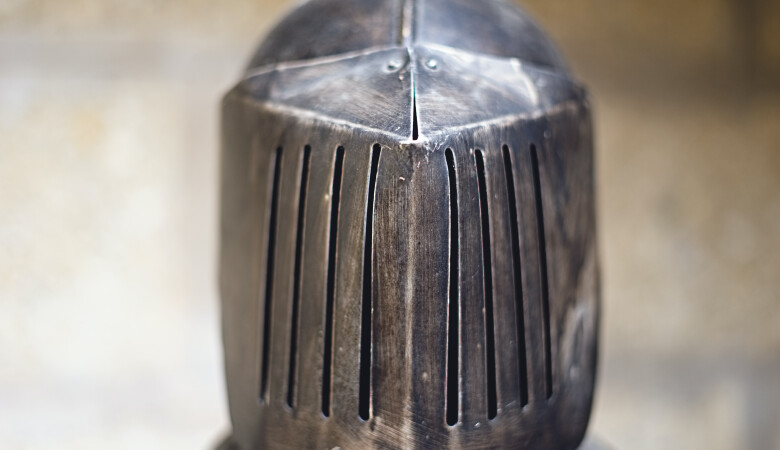A Song of Salvation for the Peace of the Oppressed (Isaiah Sermon 27 of 80)
September 16, 2012 | Andy Davis
Isaiah 26:1-21
Wrath of God, Salvation by Promise, Providence and Sovereignty of God
An expository sermon on Isaiah 26 unfolding the promises of the future heavenly peace for the elected that trust in Jesus.
- Sermon transcript -
This morning, I went as I was eating my breakfast to The Voice of the Martyrs website and was reading some of the news spots that are there. About 10 days ago in East Moscow, a church in Russia was leveled in the middle of the night by a group of unknown workers, anonymous workers, no one knew who they were, where they were coming from, but they were clearly supported by the police. And so they got bulldozers and they just leveled this church, just destroyed it. A custodian who spends the night at the church to protect it and all that was taken away to the police station and held there through the night while this was going on. So clearly the police were in collusion with the destruction of that church building. And last Sunday, our brothers and sisters in Christ in that church brought folding chairs to the pile of rubble that was their building and worship right there on the site. Praise God.
Also, on that same website, there was a story of a Nigerian pastor. He and his family, his wife and three children were assaulted in the middle of the night by at least seven Muslim men, wielding guns. They came and they shot his 24-year-old son in the leg, he was able to knock his attacker down and run. The father came and he was fired at and fell to the ground, both of them on the ground, huddled together and their attackers thought they were dead and left them, then went and found his wife and two smaller children, and ordered them to lie face down on the ground there, and then they proceeded to burn the house around them, and then left. The wife and two children were able to escape and hide in the bushes.
These attackers, these seven men were calling out, "Allahu Akbar", which is “Great is Allah”. By the way, no Christian should ever translate Allah, God. Allah, liken it to saying, greatest Molech or greatest another false god. So we don't translate it the same way, we don't believe the same things, it's not the same god. But this is the kind of persecutions going on in Nigeria and the state doesn't have the strength to shut it down because of the divided nature of Nigeria.
And then in Pakistan, there's a 14-year-old girl who has special needs. A Christian, comes from a Christian family, is accused by the religious police or the government there of burning some of the pages of the Qur’an, and she's facing the death penalty. Again, special needs mentally challenged, but with a simple faith in Christ. As a result of this case being made known, 300 Muslim extremists surrounded the area and started chanting, "Death to the unbelievers."
Well, there are other such stories, you can read about them at the Voice of the Martyrs. The reason that I specifically went to that website this morning was because of Isaiah 26. And as I'm seeking to just preach through the Book of Isaiah, I'm seeking to understand this chapter and this text, it occurred to me there's just kind of at least, but two different ways that I could approach the sermon this morning. One of them easier and the other one harder.
The easy way is to go through and find the gem verses. Okay? So the gem verses and there's at least four different gem verses in this text that just pop up off the page, there's the danger. They just pop up off the page and they're just awesome, and you can write them on 3 x 5 cards, and you can memorize them, and they'll just be incredible verses for you, they really will. I'm not being facetious. Look, for example, at Isaiah 26:3. Isaiah 26:3 is just one of those gem verses in the Book of Isaiah. Look what it says. "You will keep in perfect peace him whose mind is steadfast, because he trusts in you." Oh, what a great verse that is. So what does that tell you? Verse 4 tells you what you should do with it, trust in the Lord, because the Lord, the Lord is the rock eternal. So those two verses together are so awesome, they're on the cover of your bulletin. So you can just read them and you can say, "Wow, what great verses." So I could take maybe a quarter, a third of my preaching time and just preach on those verses. Okay?
But then there's Verse 8. I love Verse 8. Okay. “Yes, Lord, walking in the way of your laws, we wait for you. Your name and renown are the desire of our hearts.” Oh, that's another great verse, maybe not as famous as verse 3. But great, your name and renown are the desire of our hearts. So I could take a quarter of my preaching time on that verse and just tell you how awesome it is that God's name and renown would be the desire of our hearts. And then, you know, go on from there to verse 12, for example, "Lord, you establish or ordain peace for us. All that we have accomplished, you have done for us." And there I could talk about how God sovereignly works his will in our hearts, and he achieves his purposes in us by his spirit, and we can just trust in God that he is going to, as it says in Hebrews 13:21, "Work in us, what is pleasing to him, to God be the glory."
And then I could finish the sermon up at Verse 19, I think, which is another great resurrection verse. So verse 19, "But your dead will live. Their bodies will rise. You who dwell in the dust, wake up and shout for joy. Your dew is like the dew of the morning. The earth will give birth to her dead." And I would finish up that awesome sermon by preaching the resurrection. Amen! So you say, “Pastor, just do that, that sounds like a great sermon”. Yeah, well, the problem is, all the other verses. All the other verses. What about them? I don't know. We all say, “I don't know”. What is it? And Jesus said to Satan in the desert, "Man does not live on bread alone, but on every word that comes from the mouth of God." All scripture is God-breathed and is useful. My burden is all 21 verses, not just the gem verses, and the gem verses are gems, and I'm going to do some of what I just did, I guess I already did, didn't I? So they're very encouraging already, and you're already encouraged, and well, you should be, but I want to try as best I can to understand the whole chapter. And then set those gem verses in their context so that they really flourish in our life because they just think that's a better approach to the Bible.
So then what is the whole chapter about? Well, the whole chapter is set in the flow of chapters that are just really marvelous, and Isaiah 24-27, this section of Isaiah really is very much like the Book of Revelation dealing with huge, big issues throughout all of human history, right to the end of human history. And so in Isaiah 24, as we saw, it's predicting the destruction of the whole Earth and the establishment of God's reign in Jerusalem gloriously for all eternity. That was chapter 24, a marvelous chapter.
And then in 25, last week, we talked about the resurrection from the dead, and how God is going to spread a feast of banquet for all peoples, and he's going to swallow up death forever, and we're gonna sit at this banquet table, in which God is the feast, and we're going to enjoy him forever. At the end of 25 though, there's still Moab, this, I think, symbolic of the wicked of the Earth, who will not submit to God, dealing with God's judgments and basically getting crushed under the judgments of God and unable to escape them and to get away from what God is doing in judgment. So that's the end of 25, and we go right from that into 26.
“If you look at the whole chapter, this is encouragement given to the people of God, the oppressed people of God, before God does those great deliverances.”
And so, what's going on in 26? Well, if you look at the whole chapter, this is encouragement given to the people of God, the oppressed people of God, before God does those great deliverances. He's feeding the oppressed, suffering people of God with encouragement and verses and things that will help them to endure until the final judgment has come. That's what the whole chapter is about. And those gem verses fit into that overall word of encouragement to the oppressed people of God before the deliverance finally comes, that's what the whole chapter is about, which immediately brings me as an American pastor to the question of, "Well, what about us who are not going to face this level of persecution, this level of suffering, what do we do with Isaiah 26?" If I really preach this the way the chapter is written, I'm gonna be preaching about oppression, and persecution, and danger, and hiding in rooms until it passes by and then coming out and enjoy at last, the oppressors have been crushed. And it's like, "Well, that's not kind of the life we're living here in America, how do I make sense of that?" And so that work is still in front of me.
The sermon's been a work in progress all morning, and hopefully it'll be done by the time I finish preaching. Most of it anyway. But just trying to understand, we who are not going through what the church in Russia, nobody's surrounding us with a cordon of people and then taking a bulldozer and leveling our building and the police aiding and abetting it, that's not going on here. Okay? We don't have gun-wielding people running through yelling "Allahu Akbar" and shooting pastors here in the name of Allah, that's not going on in our country, not that I know of. And if so, it would be probably job, one for the police to hunt him down, it would be clearly nothing the government or the surrounding culture embraced. And neither do we have the kind of situation where that special needs 14-year-old girl is facing a death sentence, because it seems she burned some pages of the Qur’an. Truth of the matter, I don't know, I didn't research far enough to find out what actually happened. But what do we do with it? What's our context and how does Isaiah 26 fit into that? That's my job today. And try my best to explain it.
I. A Tale of Two Cities
So it begins in verses 1-6, with a marvelous song of trust in God. Look at those verses, “In that day, this song will be sung in the land of Judah, we have a strong city, God makes salvation its walls and ramparts. Open the gates that the righteous nation may enter the nation that keeps faith. You will keep in perfect peace, him whose mind is steadfast, because he trusts in you. Trust in the Lord forever, for the Lord, the Lord is the rock eternal. He humbles those who dwell on high, He lays the lofty city low, He levels it to the ground and casts it down to the dust. Feet trample it down. The feet of the oppressed, the footsteps of the poor.” So this is a song to be sung by the suffering.
Look at Verse 1, "In that day, this song will be sung in the land of Judah." So in the day of the Lord, in the day of God's deliverance, in the day when God acts. It says in the land of Judah, so this has a very Jewish setting, there's a very Jewish feel, and so it's not necessarily right for us to go immediately from here to us, we have to pass through redemptive history grid first to try to find out what Isaiah was talking about. And so Isaiah is prophesying before either of the two great exiles of the Jewish people from the promised land have happened. The Assyrian exile hasn't happened yet, the Babylonian exile hasn't happened yet. And it's going to begin, those two exiles began what Jesus called the times of the gentiles, in which the Jews are a downtrodden oppressed people who do not have political control of the promised land, and they're going to be crushed. There's going to be invasions, there's going to be one army after another coming in.
But in the middle of that time, through that time, this song of trust will be sung in the land of Judah. People are gonna be trusting in God while all that's going on, does that make sense? Trusting in God for the ultimate salvation of their souls. So they're going to sing this song in the land of Judah, this song of praise and of trust, and here we have, as Ron mentioned in his prayer, and thank you, Ron, for the City of God reference again. In this whole section, we're not gonna get away from Augustine's City of God because we keep getting city and city, and it's right here, you get verse 1, we have a strong city, God makes salvation its walls and ramparts.
So while all the suppression and destruction's going on, we have a strong city, and salvation is its wall and its rampart, it's marvelous. But then in verses 5 and 6, you get a city that's going to be destroyed by the wrath of God and downtrodden by the feet of the oppressed, the footsteps of the poor are gonna lay that lofty, arrogant city low, that's the city of man. So we have the city of God and the city of man, as we've talked about again, we have that right even in these six verses. So we have the city of God first. Now, the city of God, according to Augustine is the company of the elect of the work of God in assembling a marvelous new Jerusalem out of living stones quarried from every tribe and language and people and nation. First Peter 2 talks about that. And we are quarried out, we living stones that are set in place in a growing awesome temple. Ephesians 2, or city of God, filled with God's Spirit, giving glory to God. That's the city of God. So as the Gospel advances through evangelism and missions and people come over faith, they regenerate, they are set like living stones into this new rising city, marvelous, the city of God.
City of man, according to Augustine as Rome was invaded and in a mild way conquered by Alaric and the Visigoths for the first time, much worse judgments to come later, but the shocks were going to the edge of the known Roman world at that point, and Jerome in a cave near Bethlehem was saying it's the end of the world. And Augustine said, "No, it's just another phase of the city of man." And what is the city of man? Human culture, human military achievement, human scientific or cultural achievements, all of that city of man rising and falling, rising and falling, just going on. Built with arrogance. Built with military conquest. Built with money. Lust of the eyes, lust of the flesh, boastful pride of life. This is the world. So you have man. Those are the two cities that we have here.
Now, the city of God in Verse 1 is said to be a strong city. A strong city. We have a strong city. And it's not Jerusalem, you get that sense that those walls are coming down. No, but our city, the walls will never come down, why? Because God makes salvation its walls and ramparts as though every stone in the wall of our city has the word salvation written on it. And so, a city back then was only as strong as how high and how thick its walls were. And ramparts were where archers could stand up and shoot down at the enemies with impunity, with protection, and they could just defend the city. Could not be taken if the walls maintain their integrity, and Isaiah is saying, these walls will never come down. These walls will never come down. So salvation for the city of God is based on God's sovereign intention to save it.
God's sovereign power, later when we get to this shortly in a few months maybe in Isaiah 37. How the Assyrians have invaded and conquered the northern kingdom and deported it, and they're coming down for the Southern Kingdom of Judah, and godly King Hezekiah is in the city of Jerusalem. And Assyrian army is coming and they're going to besiege Jerusalem. They're gonna take it like every other city, so they think. And God speaks this word, I love this, he will not enter this city, he will not even shoot an arrow against it, he will not build siege works against it. By the way that he came, he will return, he will not enter this city, I will defend this city for the sake of my own glory and for the sake of David my servant. Well, what happened with the Assyrians? Who won? Yeah, you know that, you know that story. If God says they're not coming to this city, they don't come.
And so God makes salvation this city's walls and ramparts because God's sovereign power is committed to protecting it. So what does that do for us as Christians? We are safe in Jesus. Amen. We are protected in Jesus. Jesus, the Good Shepherd, said in John 10, concerning his sheep, “I give them eternal life, and no one can snatch them out of my hand. My Father, who has given them to me is greater than all, and no one can snatch them out of my Father's hand. I and the Father are one”. So we are protected, we have a strong city. God makes salvation its walls and ramparts, we are safe and secure. Verse 2 says. "Open then the gates that the righteous nation may come in, may enter the nation that keeps faith." So who gets to go in the city? Who gets to enter the city, the righteous nation, the one that keeps faith. In the Old Covenant, there was a way to keep the Old Covenant, but the keeping of that covenant did not make you righteous, so ultimately only by faith do you enter this city. Even back then in the Old Covenant days, and so also now for us, and so this addresses two things; first, who enters the city to begin with? Who's even part of this city? Friends, the answer to that is believers in Jesus Christ, by repentance and faith in Jesus, you may enter this city of salvation and you will never leave it. You'll be protected there forever and ever.
So open the gates. Open the gates that the righteous nation may enter the nation that keeps faith, but also in the end, ultimately in the Book of Revelation, we're told that the new Jerusalem with these awesome, sparkling, beautiful, precious gem walls have city gates that never get closed ever. The gates are never closed. So it says in Revelation 21:25-27 "On no day will its gates ever be shut, for there will be no night there. The glory and honor of the nations will be brought into it. Nothing impure will ever enter it, nor will anyone who does what is shameful or deceitful, but only those whose names are written in the Lamb's Book of Life". So the idea is that the new Jerusalem doesn't need to shut its gates 'cause there's no enemies on the outside anymore, they're gone. It's safe, it's secure. The warfare has ended. And so what we're supposed to do before that comes as look ahead to that city, look ahead to the time when the gates will stand open and there'll be no enemies, no threat anymore. When the universe will be cleaned up and the wicked will all be perishing in the lake of fire, and we who are the redeemed will be completely safe and peaceful. That's what it's saying. And so therefore, Isaiah gives us these gem verses in verse three and four: "You will keep in perfect peace him whose mind is steadfast because he trusts in you". Do you see the context now?
In the midst of all of this suffering, in the midst of the oppression that the new Jerusalem hasn't come yet, we have to have our minds stayed upon Jehovah, as the hymn puts it, in Like a River Glorious, stayed upon Jehovah, our minds fixed on him. And it says, "You will keep Him". And the Hebrew is beautiful. Shalom, shalom. Not just Shalom. But Sshalom, shalom. So what is shalom? Shalom is a full, rich, blessed peace that goes to every area of your life, every single area of your life, your body, your soul, your relationship with God, with each other, your material situation, everything, just the richness of blessing from God, that's shalom. But that's apparently not enough so it's shalom, shalom. The NIV just gives us “perfect peace”, as actually a number of translations do. Alright, so God will keep that person in perfect peace, whose mind is stayed upon or leaning upon or resting upon Jehovah, upon God. So it seems like our responsibility is to stay our minds upon God, don't be what James calls a double-minded man or woman, see what I'm saying? Don't be like that, but fix your mind on God, fix your mind on his promises. Look ahead to the city that's coming and yearn to live there, fix your mind on that, and God will keep you in perfect peace if you do that, ain't that beautiful?
“God will keep that person in perfect peace, whose mind is stayed upon, or leaning upon, or resting upon Jehovah.”
It's a peace like the peace that God himself enjoys. I mean, do you realize how peaceful of being God is? It's marvelous to think about that. God just sitting serenely on his throne above the circle of the Earth, he's just up there. What troubles God? What's the answer to that question? What troubles God? Nothing. Ever. He's never troubled. Now, he is compassionate, he links his heart to his people, he has all kinds of emotions tied with us as a compassionate God, but in and of himself, nothing troubles him. The eternal plan is right on schedule, friends. And nothing can stop it. He's at peace. With him, there's not a shifting shadow of doubt or fear or anything ever, ever, ever. And so God keeps a believing man or woman, boy or girl in that kind of Godlike peace, if they will just focus their minds on him and his promises. I think a parallel verse to this very much is Philippians 4:6-7. And there it says, "Do not be anxious about anything, but in everything by prayer and petition with thanksgiving, present your request to God. And the peace of God, which transcends all understanding, will guard your hearts and your minds in Christ Jesus". Do you see how connected Isaiah 26, that is? The peace of God will be a wall around you, God will exert energy to keeping you peaceful if you'll just pray and trust in him.
So Philippians 4:6-7, whatever is troubling you, whatever is burdening you today, whatever it is, your own sin, guilty conscience, alright? Financial troubles, anxieties about the future, medical issues for yourself or for a loved one, relational issues in your marriage, with your kids or your parents, brothers and sisters, friends. You're troubled by something, Philippians 4, and Isaiah 26, say, "Bring it to God and lay it as his feet. Give it to him. Cast your burdens on him and let him protect your mind. Let him keep you in perfect peace." And so it says verse 4, "Trust in the Lord forever, for the Lord, the Lord is the rock eternal." Well, that's the city of God. By contrast, the city of man is cast down. Do you see this in verse 5 and 6? He humbles those who dwell on high, he lays the lofty city low, he levels it to the ground and casts it down to the dust. Feet trample it down. The feet of the oppressed, the footsteps of the poor. So these are the poor and oppressed people of God who are going to get trampled by these wicked forces in human history, they're going to get trampled. But in the end, they're gonna do the trampling, amen. They're gonna walk over the piles of rubble and celebrate, like it says in Romans 16, I love this. "The God of peace will soon crush Satan under your feet". Isn't that a great verse?
II. A Lament While Waiting for Salvation (26:7-18)
This is the same kind of idea. The feet of the godly will walk on the rubble of wickedness, and we will live, and they will be gone. And so this is a song of encouragement to God's oppressed people before the deliverance comes. It's given to them to sing by faith, trusting before the deliverance comes, do you see verses one through six. Now, in verses 7-18, it gets a little more serious, it's more of a lament there, although there's some great encouragement, you still get a sense of the fact that the people of God are going to go through a very hard time. He begins by talking about how you wait on the Lord, verses 7-9, “Walking in righteousness, waiting for the Lord, the path of the righteous is level; you, upright one, you make the path, the way of the righteous smooth. Yes, Lord, walking in the way of your laws, we wait for you. Your name and renown are the desire of our hearts. My soul yearns for you in the night; in the morning, my spirit longs for you". So I think these verses, verses 7-9, are describing the healthy walk, the believing walk of the people of God while they're waiting for God to deliver them. You see? This is how you do it, this is how you walk with the Lord while you're waiting for the deliverance.
Isaiah speaks of the path of the upright. Despite the suffering that they're going through, their path is smooth. Path is smooth. I thought often and I've talked to my kids about this, that in the Book of Proverbs, it says, "The path of the upright is a smooth highway, but the way of the sluggard is blocked in with thorns". So the sluggard is the lazy person, the procrastinator, the messy person, all that sort of stuff. It's like if you want an easy life, don't be that way. It's a lot better to walk in God's ways, your way is made smooth by the commands of God, it's an easier, better life. Believe me, the life of the righteous is not easy, ultimately, that's the whole point of this chapter, but to some degree, God's commands make their way through the world like a highway. A cleared highway, and they know what to do. They're not in doubt. And so I think about Psalm 119:105, where the Psalm is celebrating the word of God, it says. "Your word is a lamp to my feet and a light to my path."
And so it says, "Walking in the way of your laws, we wait for you." So there's a smooth highway of the highway of God's Word, of God's laws, and that's how they wait for God. In the middle of this obedient lifestyle is a yearning to be with God, look at verse 9, it says, "My soul yearns for you in the night. In the morning, my spirit longs for you". You see the longing of this individual, they're waiting on God, longing, they're walking in obedience, but they're longing for God. And waiting for God's never easy. Read, Psalm 13, "How long O Lord, how long? Will you make me wait forever? How long must my enemy triumph over me? How long must my enemy trample me in the ground? How long is this gonna go on, O Lord?" Now again, if you're living in Nigeria, you're living in Pakistan, you're living in Iran, you're living in China, you're living in a certain place, you're asking, how long is this going to go on? Deliver me from my oppressors. But we're waiting on God, yearning for God, wanting to be with him. That's how you do it. In verse 8, going back one verse, it says, "your name and renown", I love the NIV's translation here better than the other ones, 'cause generally it's name and remembrance, but I love renown because frankly name is renown anyway, that God's name would be known in the earth, it's his fame is that God would be famous.
It's like, is God famous? Well, not as famous as he should be, unless you renown Jesus. Is Jesus famous? Oh yes, he's really famous. But he's not as famous as he should be. Amen? More people should know about Jesus. That's called missions, that's called evangelism. More people should know about Jesus. And so verse 8, what verse 8 is saying is in effect what the Lord's prayer says, right? "Our Father who art in heaven". What's the next part? "Hallowed be thy name". Verse 8, it's the same thing, "O God, may your name be exalted in the nations, may your name be held in honor, O God. May the peoples of the world praise you and know you and exalt you, O Lord", verse 8. So your name, your fame is the desire of my heart. That's powerful. That's a good way to wait, amen? A good way to wait. Well, it's also good to understand what God's judgments are for, look at verse 9, "When your judgments come upon the Earth, the people of the world learn righteousness".
So when God acts, when he moves in redemptive history and pours out his judgments, the people of the world, it says, learn righteousness. So through the flood of Noah, as God pours out water all over the surface of the Earth, the people of the world learn righteousness. As God pours out fire and brimstone on Sodom and Gomorrah, the people of the world learn righteousness. Right? As God pours out his plagues, his ten plagues on Egypt, one after the other, and the judgments come one after the other on Egypt, and God is spanking them, badly, the people of the world learn righteousness. Well, who learns? Well, Verse 10-11 says, who doesn't learn? Look at Verse 10-11. "Though grace is shown to the wicked, they do not learn righteousness. Even in a land of uprightness, they go on doing evil and regard not the majesty of the Lord. O Lord, your hand is lifted high, but they do not see it".
Frankly, when it comes to the wicked, it doesn't matter either way, what God does. If God doesn't pour out his judgments, if he defers his judgments and allows them to continue on in the same life they've always had, they think he doesn't exist, or if he exists, he approves of what they're doing and is just like them. Psalm 94 says this, "How long will the wicked, O Lord, how long will the wicked be jubilant? They pour out arrogant words, all the evil doers are full of boasting, they crush your people, O Lord, they oppress your inheritance, they slay the widow and the alien, they murder the fatherless." Listen to this, they say, "The Lord does not see, the God of Jacob pays no heed". But it says in Romans chapter 2, "But because of your stubbornness and your unrepentant heart, you're storing up wrath against yourself, for the day of God's wrath. When his righteous judgment will be revealed, God will give to each person according to what he has done.” You didn't realize that the kindness and the tolerance of God was meant to lead you to repentance. God is being patient and not pouring out his wrath on you, so that he's giving you time to repent, but it doesn't mean that he condones what you do. But then when the judgments do come, when the hurricanes come, when the earthquakes come, when the invading army comes, they think that God doesn't exist in a different way, or that God's evil or does wicked things, and so they don't learn. Verse 10, "grace, shown to the wicked, doesn't change their minds”, even though mercy and patience and tolerance is shown to them. But God does all of this to teach the elect. You know who learns? We do. Seriously. Class was in session at Noah's flood, right? When the lesson was done, who learned righteousness? Noah and his family. Because they're the only ones left. Who learned righteousness from Sodom and Gomorrah? Abraham did, and he passed on the lesson to Isaac and to his family.
“God is being patient and not pouring out his wrath on you, so that he's giving you time to repent, but it doesn't mean that he condones what you do.”
God is righteous and hates wickedness, and so it's all about the zeal that God has for his people, verse 11, "O Lord, your hand is lifted high, but they do not see it”, the wicked, “let them see your zeal for your people and be put to shame, let the fire reserved for your enemies consume them”. So the wicked people, the Assyrians, when they come in and they're successful, they misread it, they don't understand, they think their Gods are more powerful than Yahweh. When the Babylonians come, in the book of Habakkuk says, they sacrifice to their nets to their military prowess. Okay, they didn't understand. When the Persians came in, Cyrus the great, it says in Isaiah 45 "Though you do not acknowledge me". He had no idea who God was. When Alexander the Great came, he built, he just named one city after another after himself. Alexandria, Alexandria. Alexandria. "Hey, a new town, what should we name it?", "I have an idea, Alexandria". And he made himself a god and he struck coins for himself and he wanted to be worshipped. He missed the point. God was judging the wicked of the Earth through him, and soon he would judge him too.
God is glorified in crushing tyrants and enlarging the nation. Look at Verses 12-15, "Lord, you established peace for us, all that we have accomplished, you have done for us, O Lord, our God, Other Lords besides you have ruled over us, but your name alone do we honor. They are now dead, they live no more. Those departed spirits do not rise. You punished them and brought them to ruin, you wiped out all memory of them". Verse 15, "You have enlarged the nation, O Lord, You have enlarged the nation. You have gained glory for yourself, you've extended all the borders of the land." So this is speaking of God's glory in crushing these tyrants, establishing peace for the remnant, and judging in verse 13 and 14, the tyrants who ruled over the Jews and rolled over the people of God at that time. They're dead now, all of them. Where is Pharaoh? He's dead now. Where's Sennacherib, king of Assyria? He's dead now. All of them, they're dead. And they rise no more, their time of judgment came and they died, but God re-established his people, showed grace to them and actually enlarged the borders of their land and gave them great population. He restored them.
Now, godly Jews in the midst of all of this did not say, “Lord, thank you so much for restoring us and increasing our population and all that, I know it's because we were so righteous as we obeyed your laws.” Oh, dear friends, just read Daniel chapter 9, Daniel is on his face saying, “God, we have acted wickedly and we broke your commandments.” Ezra did the same thing, Nehemiah did the same thing. All of the godly knew that they presented wickedness to God in disobedience. So therefore, verse 12, the honesty says, “O Lord, anything good in us, you worked in us. All that we have accomplished, you have done through us.” Do you realize how important a theme that is? Preached on it a few weeks ago in Hebrews 13:21. "O God, would you please work in us what is pleasing to you?" So here's another gem verse, but I'm just telling you, if there's something wrong in your life, if you're being disobedient, if there's some active unrighteousness, bring this to God, “God, work righteousness in me. God, transform me. And if you will do that, I will give you the full glory for the change in my life.” And so it says very plainly in John, chapter 3:20-21. "Everyone who does evil hates the light, and will not come into the light for fear that his deeds will be exposed, but everyone who lives by the truth comes into the light, so that it may be seen plainly that what He did has been done through God."
So on judgment day, we come with our good deeds and we say, "God, you did all of this in us, praise you forever." That's the way we cast our crowns down before Jesus and give him praise and glory. Or as Philippians 2:13 says, "May God work in us." Or it says in 2:13 is "God who works in us to will and to act according to his good purpose." And so, God enlarges the nation. Is this merely speaking about the restoration of the Jews seven years after the Babylonian exile? I don't think so. Forty thousand Jews came back and we got re-established in the promised land, and that was significant. But friends, I'm just gonna see missions in verse 15, what do you say? He's going to enlarge the borders or the boundaries of Israel, he is going to enlarge the nation, he is going to extend it, he's going to gain glory for himself by extending the borders of the land. Amen. Hallelujah.
How about we gentiles become honorary Jews by adoption? We can be sons and daughters of Abraham. What do you say? Does that sound good to you? And we will take on the promises made to Abraham, and we'll believe them for ourselves and will be included in that whole thing, and we'll get to sit with Abraham, Isaac and Jacob at a Jewish table in the kingdom of heaven forever. Does that sound good to you? I'm fine being grafted into a Jewish tree. I was cut out of a wild olive shoot and I was grafted into a Jewish cultivated tree. Amen. I'm an honorary Jew. And that's how God extended the borders of the land by missions, by evangelism, by being Jesus being a light to the gentiles, a glory to his people, Israel. But in the meantime, verses 16-18, we lament our weakness, it's still hard. And this is the reality of it, this is why I say if you're living in Nigeria, if you're living in Pakistan, if you're living in Iran, you're living in China, you're living in these places; these verses say, "God actually sees what I'm going through.” Thank you for Isaiah 26. Thank you for speaking to my situation, 'cause I'm going through a really hard time right now.
Lord, they, the people of God came to you in their distress. When you discipline them, they could barely whisper a prayer. As a woman with child and about to give birth writhes and cries out in her pain, so are we in your presence. We were with child, we writhe in pain, but we gave birth to wind, nothing good came out of all of our agonies, all of our labors had amounted, it seems to nothing, we've not brought salvation to the earth, we have not given birth to people of the world. These people under the oppressors feel their weakness, they're not actually able to achieve the purposes of God in this world, they are just getting crushed and they can barely whisper a prayer to God.
III. The Joyful End: Resurrection and Deliverance (26:19-27:1)
They yearn for God to step in and end their suffering, and so God does. In verses 19-21, "But your dead will live. Their bodies will rise. You who dwell in the dust, wake up and shout for joy. Your dew is like the dew of the morning. The earth gives birth, will give birth to her dead." Now, why does resurrection come in? First of all, this is one of those great, great passages on resurrection in the Old Testament. I was talking to Kyle Mercer this week, he's taking a class at Duke on the resurrection. And so one of the messages there is there's a hint that there's no resurrection in the Old Testament. Have you heard that? Oh my goodness.
It came in with the Greek philosophers, the idea of the immortality of the soul, and then by the time the New Testament is written, it had taken root. Oh, friends. How about Isaiah 26:19? As you look down and you read these, or do you see any resurrection here? Are you seeing any resurrection in there. Let me read it again, I'll read it slowly. "But your dead will live." I'm thinking resurrection. I'm thinking that. "Well, yeah. But not bodily resurrection. This is a metaphor." Well, let's keep reading. "Their bodies will rise." Okay. [chuckle] Hard, hard to avert the force of it. “You who dwell in the dust, wake up and shout for joy. Your dew is like the dew of the morning. The earth will give birth to her dead.” Okay, text, you win. This is resurrection. Why does it come in here? Why here? Why now? Because a lot of God's people actually get killed. They actually do die. The blood of martyrs is seed for the church. They actually die. And if you remain... By the way, the text is for we who remain, the ones who went on ahead, they're happy, they're fine, they don't actually even need the physical Bible, they get God face-to-face teaching them. Amen. We're the one seeing through the glass darkly, so we get promises like this, and so we are to know that our brothers and sisters who got crushed and died will rise again, they will come alive. Ultimate victory. And so the martyrs in Revelation 6, the fifth seal are under the altar crying out saying, "How long O Lord, until we get our vengeance?" They're looking for vengeance there in Revelation, and God tells them "Wait a little bit, wait a little longer, until the full number of the martyrs would come in. And then I'm gonna deal with it." And you can read about God's dealing with it in the rest of the Book of Revelation.
So resurrection will come, and his name is Jesus. His name is Jesus. Jesus said to Martha, your brother will rise again. "Oh, Lord, I know he'll rise at the resurrection on the last day, I read Isaiah 26:19. I know there's a resurrection coming." Jesus said, "I am the resurrection and the life. He who believes in me will live even though he dies. And whoever lives and believes in me will never die." So resurrection is coming, his name is Jesus. In the meantime, ride it out. That's what verse 20 and 21 is saying in the meantime, ride it out, "Go, my people, enter your rooms, and shut the doors behind you. Hide yourselves for a little while until His wrath has passed by. See, the Lord is coming out of His dwelling to punish the people of the earth for their sins. The earth will disclose the blood shed upon her. She will conceal her slain no longer."
So this is the Nigerian pastor and his wife and kids running in the dark of the night and finding a bush and hiding behind it. So the text says to do "Go hide yourself until it passes by, find a place of refuge and hunker down and just survive. Do the best you can to get through it until finally, the judgments come." And they will come. The earth is going to, verse 21, "disclose the blood shed upon her." So in the Nigerian story, the blood came from the leg of his 24-year-old son, went down in the earth, drank it in. The earth's been doing that a long time. Since the time of Cain, remember? Remember how God said to Cain, "What have you done? Listen, listen, do you not hear it? Your brother's blood cries from the ground.” What does it cry for? For vengeance. It cries for justice. And so the earth is going to disclose the blood shed upon it. These wicked oppressors will be judged.
Application: What Does This Say to Us Today?
So what application can we take from this? Well, first come to Christ, he is the only refuge from the real storm that's coming. Jesus is the refuge, He's the hiding place. Flee of Christ. You came this morning to hear exposition on Isaiah 26, but if you're not a believer, I think you came to hear this, "Jesus saves sinners." All you have to do is cry out to the Lord, ask him to save your soul. Say, I'm a sinner, I deserve to go to hell. I have no righteousness to offer you, I don't wanna go to hell. Would you please save me, Jesus? His blood shed on the cross is sufficient for you and for me. Trust in him, he's the refuge, he is salvation whose walls surround you.
Secondly, for we who live in America, pray for the persecuted church. Find out about them. Go to ‘Voice of the Martyrs’, google that, or just persecution.org, I think it is. Just dial in and then read these stories, and then like Isaiah 26 changes for you a bit. It's like, "Oh, I see it now, I get it, I get why this chapter's here." You say, "Well, what about us? We don't go through this kind of persecution." Well, I've covered this in other sermons, we have our own versions, and it's proportional to our faithfulness in evangelism, the more faithful you are in evangelism, the more you're gonna get smacked a bit by Americans. It's just gonna happen. So if you're faithful in evangelism, you're gonna get the back of someone's hand metaphorically, or maybe even literally, I don't know.
For the present, the government will not support it, but if they're gonna keep booing God at national conventions, I don't know how the future looks about that. So I guess I would also say don't expect a peaceful relationship with the surrounding world and the surrounding culture, don't expect it and think something strange is happening when they smack us, get that out of this. And then just look at the lessons that he gives in this chapter on how to live in the meantime, so verse 3, "Keep your mind stayed upon the Lord." Verse 4, "Trust in the Lord, let Him bring peace to you in circumstances that are difficult." Verse 8, "Walk in the ways of God's laws, by the power of the Spirit."
Wait for the Lord, wait for him to bring about his end. Verse 8, "Let God's name and renown be the desire of your heart.” Live for missions and evangelism. Live for those things, verse 9, understand the purpose of God's judgments are to teach you righteousness, that you can learn righteousness. Verse 12, understand that all of your good works, God has worked in you and give him the glory. And eighth, hunker down, it's going to get worse before it gets better. It's just Jesus said, "In this world, you will have trouble, but take heart, I've overcome the world." Close with me in prayer.
Father, we thank you for the time that we've had to study in your word, I thank you for the lessons of Isaiah 26. Father, help us to take to heart these messages. I pray one more time for any unregenerate person, any lost person, somebody who just doesn't know how to go to heaven who feel so guilty for their sins, let them turn to you, Lord Jesus now and say, Jesus save me. Pray this in Jesus name. Amen.































